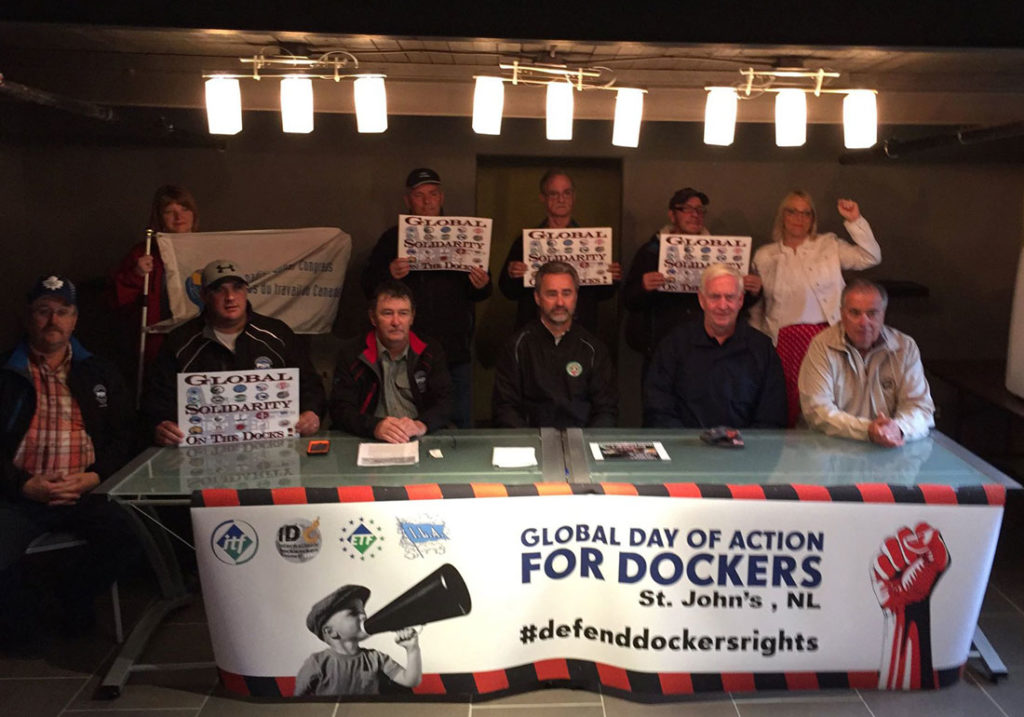ILA’s Participation in Global Day of Action Is Underway This Morning; Tens of Thousands of ILA members Joining Millions of Dockworkers Worldwide In One Hour Observance To Highlight Contributions of Longshore Workers
NORTH BERGEN, NJ – (Thursday, July 7, 2016) Tens of thousands of members of the International Longshoremen’s Association, from Eastern Canada, Atlantic and Gulf Coast Ports, Great Lakes region and Puerto Rico are joining millions of Dockers from nearly 50 other countries worldwide this morning is a “Global Day of Action for Dockers”. Observances are being staged at most ports around the world from 8 a.m. to 9 a.m., local time where longshore workers will draw attention to the contributions dockworkers make to the world economy, an to draw attention to the risks involved in their work.
“The ILA is proud and honored to join with our Sister and Brother across North America and around the world today participating in this Global Day of Action,” said ILA President Harold Daggett. “Dockers everywhere are standing together this morning to bring attention to health and safety issues, a recognition of the precarious work our members do; respect for collective bargaining rights and agreements; a protection of labor standards in our global economy and automation and social justice.
“May ILA Locals are also using this morning’s observance to remember and memorialize waterfront workers who have lost their lives to workplace accidents,” continued President Daggett. “It’s a Day of Observance and a Day of Remembrance.”
The ILA leader noted that over the past decade alone, 33 longshore workers have lost their lives to accidents.
In addition to the ILA and International Longshore and Warehouse Union (ILWU) participating in this morning’s observance at their ports in the U.S. and Canada, other countries joining in this Global Day of Action,” include:
Algeria, Argentina, Australia, Bahrain, Belgium, Benin, Brazil, Chile, Colombia, Costa Rica, Cyprus, Denmark, Ecuador, El Salvador, Estonia, France, Germany, Ghana, Greece, Guatemala, Honduras, Hong Kong, India, Ivory Coast, Japan, Jordan, Malta, The Netherlands, New Zealand, Nigeria, Norway, Panama, Paraguay, Poland, Portugal, Russia, Senegal, Slovenia, Spain, Sri Lanka, Sweden, Togo, Turkey, United Kingdom, Uruguay and Venezuela.
This Global Day of Action was organized by the International Dockworkers’ Council (IDC); International Transport Workers’ Federation (ITF) and European Transport Workers’ Federation (ETF). The three organizations called on Dockers’ unions around the world to organize an hour of activities on International Dockers’ Action Day, Thursday, July 7, 2016 between 8 a.m. and 9 a.m.
The aim of the day is to raise awareness with the public about the vital contribution dockworkers make to the world economy, the risks they face at work every day and to highlight the growing attacks on working conditions in ports. A tribute to fallen and injured workers will be included.
Under the slogan, “Defend Dockers Rights,” the Global Day of Union Action is an opportunity for port workers to call for: improved health and safety in the workplace, an end to job deregulation, respect for bargaining rights and collective agreements, the need for universal labor standards in GNTs, the concerns over automation processes in terminals and social justice.
Jordi Aragunde, IDC general coordinator said: “This is the first time the world will carry out a collective action which highlights the contribution of dockworkers to the world economy and which speaks to professional risks involved in their work. This action will display the resolve of these works to defend not only the security of their jobs, but also their working conditions, dignity and collective bargaining.
“In our industry, shipping lines are grouped into alliances and port operators join forces to develop uniform strategies to achieve the same goals in all ports of the world. We are now united workers who want to respond to our own needs.”
ITF president, Paddy Crumlin said: “This day is a reaction to the fact that attacks on dockers aren’t going away; they’re escalating all the time all over the world. The international dockers’ community isn’t going to stand for poor conditions, automation without union consultation or downgrading of the professional status of dockworkers.”
This is longshoremen, dockers, wharfies in every corner of the world being clear about that and taking collective action to raise their profile and send a message to employers.
The International Dockworkers Council (IDC) is a global trade union confederation, formally founded in Santa Cruz de Tenerife in 2000. It currently brings together more than 85,000 dockworkers on five continents and works to defend workers and their jobs through training and continuous improvement of their working conditions.
Headquarter in Barcelona, Spain, the IDC is organized into six areas (Europe, Africa, Western North America and Pacific Coast, East Coast of North America, Oceania and Latin America), each with its Coordinator appointed Assembly.)
The International Transport Workers’ Federation (ITF) is an international federation of transport workers’ trade unions. Any independent trade union with members in the transport industry is eligible for ITF membership.
Around 700 unions representing over 4.5 million transport workers from some 150 countries are members of the ITF. It is one of several global unions federation unions allied with the International Trade Union Confederation (ITUC)
The ITF’s headquarters is in London and it has offices in Amman, Brussels, Nairobi, New Delhi, Ouagadougou, Rio de Janeiro and Tokyo.
The European Transport Workers’ Federation (ETF) is a new pan-European trade union organization, which embraces transport trade unions for the European Union, the European Economic Area and Central and Eastern European countries.
The ETF represents more than 3.5 million transport workers from more than 230 transport unions and 41 European countries, in the following sectors: railways, road transport and logistics, maritime transport, inland waterways, civil aviation, ports and docks, tourism and fisheries.

